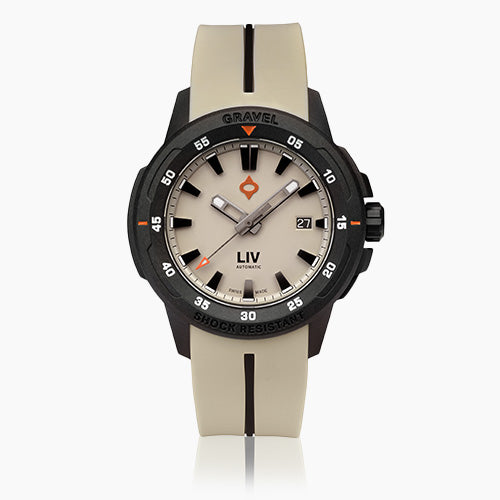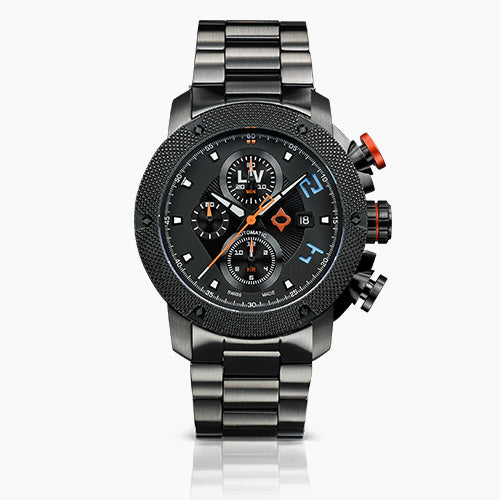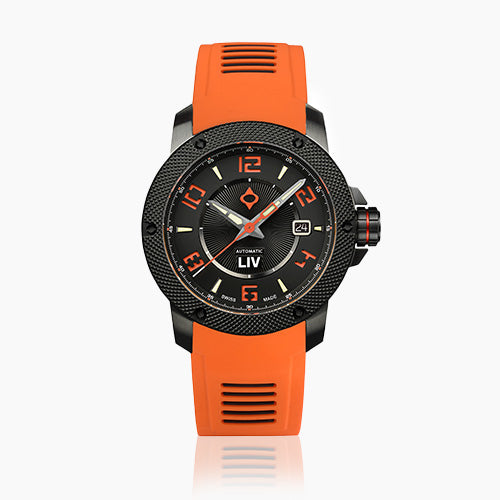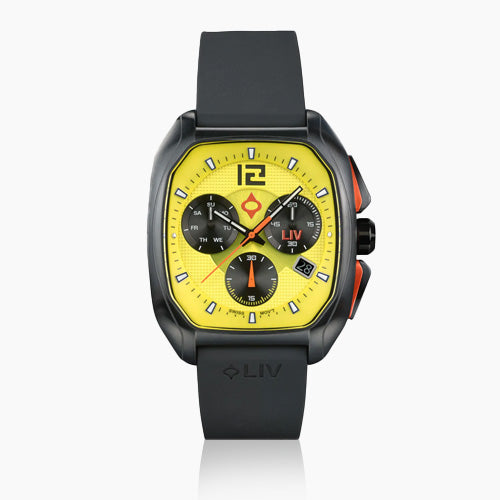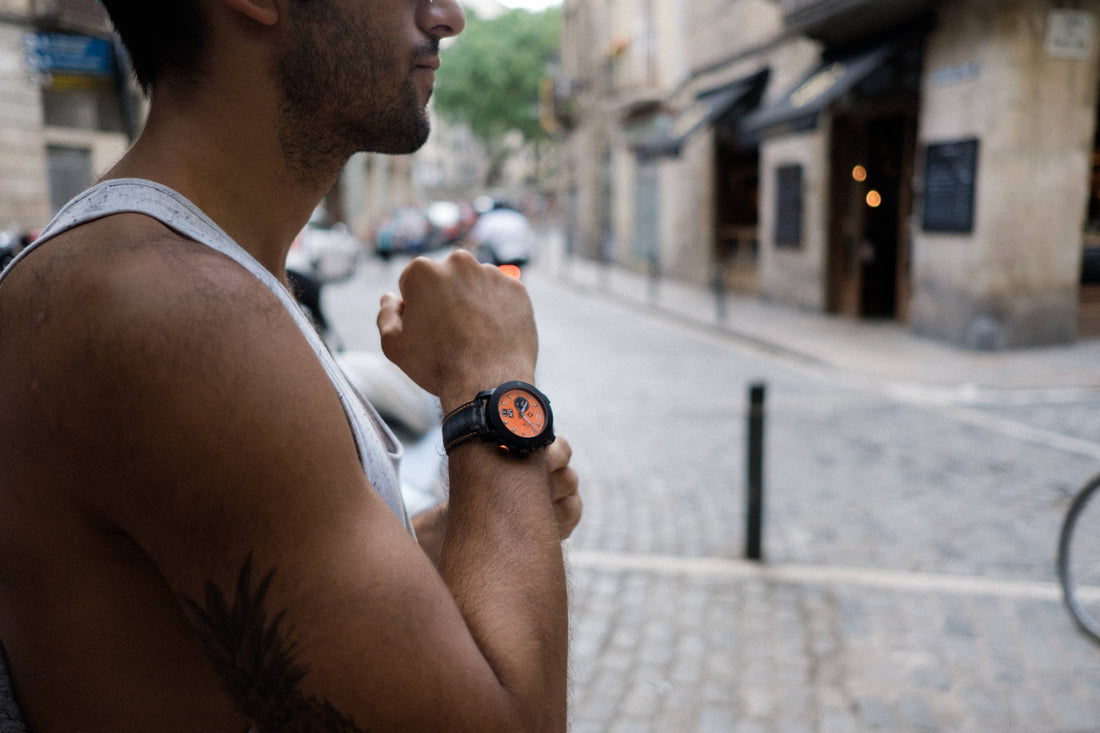
Sounding the Alarm: Alarm Watches & the GX Analog
Share
WHETHER WE LIKE IT OR NOT, TIME DEFINES OUR ENTIRE LIVES.
It breaks up our life into increments that literally tell us when to do what is needed where and how. Why we are so compelled to have our lives run by time is a question so primal that it’s safely beyond the scope of this article!
The legendary American author Ray Bradbury once said: “I don't need an alarm clock. My ideas wake me.” We’re not all that lucky or inspired first thing in the morning, and so most of us need something a tad more insistent to wake us up. Of course, an alarm can also be set as a reminder for something we need to do during the day. We all need a little jolt sometimes.
It’s no wonder that some watchmakers turned their attention to making alarm watches, LIV Watches included. This article will delve into what makes an alarm watch, as well as brag about one of our very own alarm watch models. We’ll also point out three of our favorite alarm watches by other watchmakers, two of which are vintage icons in the class.
THE ALARM WATCH - BEGINNINGS & POPULARITY
It all started with the mechanical alarm clock, the first one of which was patented by Frenchman Antoine Redier in 1847. It was the first fully-adjustable clock that allowed a person to set an alarm for the exact time they wanted. Previous alarm clocks had simply chimed at the same time every day.

In 1908, Swiss watchmaker Eterna was the first to patent an alarm watch. However, alarm watches would only really come into their own after World War II. Why the delay? It’s simple: a wrist watch has far less space than a clock in order to accommodate the vibration to parts that an alarm complication will cause. Therefore, housing an alarm complication within a watch movement was tricky. Early models tended to be either too complicated, inaccurate, or simply not loud enough!

It’s worth noting that alarms are relatively common in quartz watches, yet remain fairly rare in mechanical watches. As already noted, their complexity as a complication is a leading cause of this, not to mention their low profile these days.
HOW DOES AN ALARM WATCH WORK?
An alarm complication allows the watch owner to set an alarm at any specific time during a 12-hour period. An alarm itself is mechanically a relatively simple device. Setting a time winds a barrel which stores energy. When the preset time is reached, that stored energy is released, which turns a gear that sets a hammer back and forth against a resonating chamber, gong, or bell.
With that mechanics in mind, a traditional mechanical alarm watch works by means of the mechanism coupled to the movement. The movement necessitates a stand-alone alarm hand, which is connected to a notched cam underneath the dial. This alarm hand is often thicker and stubbier than the other hands on the dial, so as to set it apart visually and functionally.
Setting a time winds a barrel which stores energy. When the preset time is reached, that stored energy is released.
At the set time the cam activates a lever, which in turn releases the stored energy from the mainspring that strikes a tiny hammer on a resounding part, usually a bell or gong of some type. The alarm can even be sounded by the hammer striking the case of the watch itself. The alarm time can only be reset once the mainspring has been rewound.
It’s worth noting here that the alarm sound from any wristwatch will usually be substantially amplified by any surface on which the watch is placed, such as a bedside table. That is why many alarm watch enthusiasts, and even reviewers of these watches, claim that an alarm watch should awaken even the heaviest sleeper!

OUR ALARM WATCH, THE GX ANALOG
Yes, we at LIV Watches simply had to make our own alarm watch. That’s what you get with a team of watchmakers as passionate about innovation as we are. We simply couldn’t resist! In a world full of digital watches where smartphones double as alarm clocks, we felt the area was lacking a little originality. And so we designed and produced our much-loved GX Analog with standout alarm feature.
As we like to say regarding this fabulous timepiece: “Practicality meets fantastic design in this analog alarm timepiece, perfect for reminding you of your next adventure's start time.”
As you can see, we’re very modest about our alarm watch!

Seriously, we like to think of the alarm being the star of this terrific quartz watch. The pusher at the 4 o’clock position is used to set the alarm and reference time. These are comfortably displayed in the sub-dial at the 9 o’clock position. As watch lovers ourselves, we're proud to continue the fine, rich tradition of niche watchmaking in our own way.
- Esti Chazanow
Co-Founder at LIV Watches
- An ultra-reliable 7-jewel quartz Swiss RONDA Startech 4120.B movement
- 43mm thickness
- High-quality 316L stainless steel case
- High-grade sapphire crystal with anti-reflective coating for that high-end, clean look
- Big date feature at the 6 o’clock position
- 60-second and alarm/reference time sub-dials
- Maximum scratch resistance
- Available with either a supple, double-injected silicone strap or a 316L stainless steel bracelet that perfectly matches the case with adjustable, push-button clasp
- A numbered Limited Edition of just 3000 watches.

As with all our watches, legions of our customers have raved about this LIV analog watch with alarm feature. One enthused customer was Jonathan G. from the US, who wrote to us to say: “Loving the LIV. What a spectacular piece of craftsmanship! I’ve purchased 4 of these LIV watches and it’s difficult to decide which one to wear. The style, colors and detail are off the charts! It’s exciting to watch (no pun intended) what will be kickstarted next! Keep pressing on with the great innovation and magnificent design of these LIV watches!!”
Another very happy customer was Mark C. from the UK, who wrote: “Stunning looks and has the bonus of an alarm. Another blinder from LIV - their usual high quality design but with the addition of an alarm. So not only does it look good but it has added practicality too. No excuse now to get one of LIV's great watches.”
Thank you, gentlemen - we love this watch too.
Now let’s turn to three alarm watches by other watchmakers that we also like and admire.
OTHER ALARM WATCHES WE LIKE
VULCAIN CRICKET
Eterna may have patented the first alarm watch in 1908, but the wristwatch that really took the alarm complication to the next level was the Vulcain Cricket. Vulcain, a Swiss watchmaker that was founded in 1858, and which built its reputation on high-end pocket watches, released its alarm watch in 1947. The watchmaker had produced a prototype by 1942 which had solved the problem common to all alarm watches until then: vibration. This had been overcome by using two separate barrels, one for the movement and the other for the alarm function itself. This created a lot less vibration. It also meant the alarm could sound for a solid 25 seconds.
The watchmaker had produced a prototype by 1942 which had solved the problem common to all alarm watches until then: vibration. This had been overcome by using two separate barrels, one for the movement and the other for the alarm function itself. This created a lot less vibration. It also meant the alarm could sound for a solid 25 seconds.
However, one issue persisted: too low volume. The French physicist Paul Langevin was brought on board to crack the problem and he used the cricket as analogy: it was a tiny insect, yet it produced enough noise to be audible at large distances. Five years later Vulcain’s alarm function was finally ready. A perforated double case back acted as a type of echo chamber that amplified the alarm. Fittingly, the strident, whirring sound of the alarm was akin to that of a cricket. And so the Vulcain Cricket entered the history books.
The Vulcain is also notable for being known as “The Watch for Presidents,” or, specifically, American presidents. The first one was presented to Dwight Eisenhower on the eve of his leaving office in 1953, and has since been worn by various US Presidents, including Harry Truman, Richard Nixon, Jimmy Carter, Bill Clinton, and Barack Obama.
Lyndon B. Johnson was an especially big fan of the watch, having his signature engraved on the dial of how own model, and also buying 200 Vulcain Crickets to give away as gifts during his time as president.

Vulcain's advertisement proclaiming the Cricket's "Watch of Presidents" status.
JAEGER-LECOULTRE MEMOVOX
Jaeger-LeCoultre is one of the most sought-after luxury Swiss watch and clock manufacturers. The company was founded in 1833 and is one of the most innovative high-end watchmakers in the world. This includes hundreds of patents and over one thousand movements to its name. Jaeger-LeCoultre’s innovations include the world's smallest movement, and one of the world's most complicated watches, the iconic Grande Complication, with its multi-axis tourbillon. And that’s not to mention the Atmos clock, an iconic timepiece of near-perpetual movement.
No wonder Jaeger-LeCoultre got into the innovative alarm watch business. Its signature alarm watch is the aptly named Memovox, which translates from Latin as “the voice of memory”. It was first introduced in 1952 and had two separate crowns, which meant the alarm and timekeeping components of the movement could be wound separately. The Memovox quickly became a hit in the 1950s. One of its most famous fans was the legendary silent film actor and director Charlie Chaplin.

Jaeger-LeCoultre Memovox
That model was replaced in 1956 by a new calibre that made the Memovox the first automatically-wound alarm watch. The alarm function on that model was still wound separately from the rest of the movement, based in a pendulum which rotated at an angle of approximately 110 °. The alarm sound of the Memovox is said to be like the ringing of an old telephone, which in itself gives the watch a charming vintage feel.
The classic Memovox design is still available today in both steel and rose gold. The modern version uses classic styling, such as triangular indexes and dauphine hands, with the latest blue dial model being inspired by a popular version of the Memovox from the 1970s.
GLASHÜTTE ORIGINAL SENATOR DIARY
Glashütte Original was founded in 1994 due to the privatization of GUB, a watchmaker from what was the former German Democratic Republic (GDR, or East Germany). It has since become a prestigious watch manufacturer. One of the models for which it became renowned was its alarm watch, the Senator Diary.
 What sets this alarm watch apart from all others is that it is the only mechanical watch whose alarm can be set more than 30 days in advance. That means a wearer can set his watch to the precise date and time for a particularly important appointment or event within a 30-day period. That is impressive.
What sets this alarm watch apart from all others is that it is the only mechanical watch whose alarm can be set more than 30 days in advance. That means a wearer can set his watch to the precise date and time for a particularly important appointment or event within a 30-day period. That is impressive.
Nearly the entire watch is designed, manufactured, finished, and painstakingly assembled at the company’s factory in Saxony. The Glashütte Original Senator Diary has an in-house movement, the Caliber 100-13, which comprises 600 parts. The movement includes the 340 parts that comprise the technically complex alarm and appointment functions. A terrific feature of this watch is a second spring barrel that ensures the alarm remains wound and functioning, even if the watch has run down.

An alarm on a man’s wrist may have become ‘a thing of the past.’ But like so many things of the past, attention to detail and the finest craftsmanship continues to prove irresistible for some watch lovers.
Having that watch alarm bleep on your wrist or on your bedside table may still be better than what any smartphone can muster!
About the Author

Esti Chazanow, Co-Founder at LIV Watches
Esti's passion for men's watches led her to co-found LIV Watches—a microbrand dedicated to connecting watch collectors with high quality, limited edition, Swiss Made timepieces at prices they can afford—and the rest is horological history.




